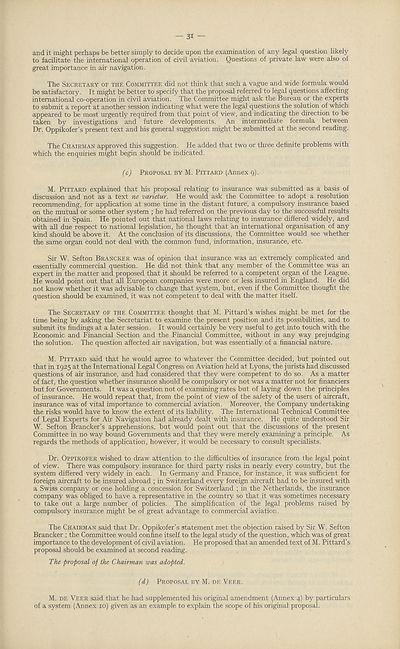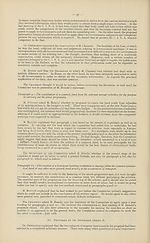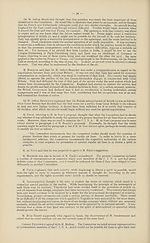Communications and transit > Air transport co-operation committee : minutes of the first session : held at Geneva from July 8th to 12th, 1930
(31)
Download files
Complete book:
Individual page:
Thumbnail gallery: Grid view | List view

3i —
and it might perhaps be better simply to decide upon the examination of any legal question likely
to facilitate the international operation of civil aviation. Questions of private law were also of
great importance in air navigation.
The Secretary of the Committee did not think that such a vague and wide formula would
be satisfactory. It might be better to specify that the proposal referred to legal questions affecting
international co-operation in civil aviation. The Committee might ask the Bureau or the experts
to submit a report at another session indicating what were the legal questions the solution of which
appeared to be most urgently required from that point of view, and indicating the direction to be
taken by investigations and future developments. An intermediate formula between
Dr. Oppikofer’s present text and his general suggestion might be submitted at the second reading.
The Chairman approved this suggestion. He added that two or three definite problems with
which the enquiries might begin should be indicated.
(c) Proposal by M. Pittard (Annex 9).
M. Pittard explained that his proposal relating to insurance was submitted as a basis of
discussion and not as a text ne varietur. He would ask the Committee to adopt a resolution
recommending, for application at some time in the distant future, a compulsory insurance based
on the mutual or some other system ; he had referred on the previous day to the successful results
obtained in Spain. He pointed out that national laws relating to insurance differed widely, and
with all due respect to national legislation, he thought that an international organisation of any
kind should be above it. At the conclusion of its discussions, the Committee would see whether
the same organ could not deal with the common fund, information, insurance, etc.
Sir W. Sefton Brancker was of opinion that insurance was an extremely complicated and
essentially commercial question. He did not think that any member of the Committee was an
expert in the matter and proposed that it should be referred to a competent organ of the League.
He would point out that all European companies were more or less insured in England. He did
not know whether it was advisable to change that system, but, even if the Committee thought the
question should be examined, it was not competent to deal with the matter itself.
The Secretary of the Committee thought that M. Pittard’s wishes might be met for the
time being by asking the Secretariat to examine the present position and its possibilities, and to
submit its findings at a later session. It would certainly be very useful to get into touch with the
Economic and Financial Section and the Financial Committee, without in any way prejudging
the solution. The question affected air navigation, but was essentially of a financial nature.
M. Pittard said that he would agree to whatever the Committee decided, but pointed out
that in 1925 at the International Legal Congress on Aviation held at Lyons, the jurists had discussed
questions of air insurance, and had considered that they were competent to do so. As a matter
of fact, the question whether insurance should be compulsory or not was a matter not for financiers
but for Governments. It was a question not of examining rates but of laying down the principles
of insurance. He would repeat that, from the point of view of the safety of the users of aircraft,
insurance was of vital importance to commercial aviation. Moreover, the Company undertaking
the risks would have to know the extent of its liability. The International Technical Committee
of Legal Experts for Air Navigation had already dealt with insurance. He quite understood Sir
W. Sefton Brancker’s apprehensions, but would point out that the discussions of the present
Committee in no way bound Governments and that they were merely examining a principle. As
regards the methods of application, however, it would be necessary to consult specialists.
Dr. Oppikofer wished to draw attention to the difficulties of insurance from the legal point
of view. There was compulsory insurance for third party risks in nearly every country, but the
system differed very widely in each. In Germany and France, for instance, it was sufficient for
foreign aircraft to be insured abroad ; in Switzerland every foreign aircraft had to be insured with
a Swiss company or one holding a concession for Switzerland ; in the Netherlands, the insurance
company was obliged to have a representative in the country so that it was sometimes necessary
to take out a large number of policies. The simplification of the legal problems raised by
compulsory insurance might be of great advantage to commercial aviation.
The Chairman said that Dr. Oppikofer’s statement met the objection raised by Sir W. Sefton
Brancker ; the Committee would confine itself to the legal study of the question, which was of great
importance to the development of civil aviation. He proposed that an amended text of M. Pittard’s
proposal should be examined at second reading.
The proposal of the Chairman was adopted.
(d) Proposal by M. de Vfer.
M. de Veer said that he had supplemented his original amendment (Annex 4) by particulars
of a system (Annex 10) given as an example to explain the scope of his original proposal.
and it might perhaps be better simply to decide upon the examination of any legal question likely
to facilitate the international operation of civil aviation. Questions of private law were also of
great importance in air navigation.
The Secretary of the Committee did not think that such a vague and wide formula would
be satisfactory. It might be better to specify that the proposal referred to legal questions affecting
international co-operation in civil aviation. The Committee might ask the Bureau or the experts
to submit a report at another session indicating what were the legal questions the solution of which
appeared to be most urgently required from that point of view, and indicating the direction to be
taken by investigations and future developments. An intermediate formula between
Dr. Oppikofer’s present text and his general suggestion might be submitted at the second reading.
The Chairman approved this suggestion. He added that two or three definite problems with
which the enquiries might begin should be indicated.
(c) Proposal by M. Pittard (Annex 9).
M. Pittard explained that his proposal relating to insurance was submitted as a basis of
discussion and not as a text ne varietur. He would ask the Committee to adopt a resolution
recommending, for application at some time in the distant future, a compulsory insurance based
on the mutual or some other system ; he had referred on the previous day to the successful results
obtained in Spain. He pointed out that national laws relating to insurance differed widely, and
with all due respect to national legislation, he thought that an international organisation of any
kind should be above it. At the conclusion of its discussions, the Committee would see whether
the same organ could not deal with the common fund, information, insurance, etc.
Sir W. Sefton Brancker was of opinion that insurance was an extremely complicated and
essentially commercial question. He did not think that any member of the Committee was an
expert in the matter and proposed that it should be referred to a competent organ of the League.
He would point out that all European companies were more or less insured in England. He did
not know whether it was advisable to change that system, but, even if the Committee thought the
question should be examined, it was not competent to deal with the matter itself.
The Secretary of the Committee thought that M. Pittard’s wishes might be met for the
time being by asking the Secretariat to examine the present position and its possibilities, and to
submit its findings at a later session. It would certainly be very useful to get into touch with the
Economic and Financial Section and the Financial Committee, without in any way prejudging
the solution. The question affected air navigation, but was essentially of a financial nature.
M. Pittard said that he would agree to whatever the Committee decided, but pointed out
that in 1925 at the International Legal Congress on Aviation held at Lyons, the jurists had discussed
questions of air insurance, and had considered that they were competent to do so. As a matter
of fact, the question whether insurance should be compulsory or not was a matter not for financiers
but for Governments. It was a question not of examining rates but of laying down the principles
of insurance. He would repeat that, from the point of view of the safety of the users of aircraft,
insurance was of vital importance to commercial aviation. Moreover, the Company undertaking
the risks would have to know the extent of its liability. The International Technical Committee
of Legal Experts for Air Navigation had already dealt with insurance. He quite understood Sir
W. Sefton Brancker’s apprehensions, but would point out that the discussions of the present
Committee in no way bound Governments and that they were merely examining a principle. As
regards the methods of application, however, it would be necessary to consult specialists.
Dr. Oppikofer wished to draw attention to the difficulties of insurance from the legal point
of view. There was compulsory insurance for third party risks in nearly every country, but the
system differed very widely in each. In Germany and France, for instance, it was sufficient for
foreign aircraft to be insured abroad ; in Switzerland every foreign aircraft had to be insured with
a Swiss company or one holding a concession for Switzerland ; in the Netherlands, the insurance
company was obliged to have a representative in the country so that it was sometimes necessary
to take out a large number of policies. The simplification of the legal problems raised by
compulsory insurance might be of great advantage to commercial aviation.
The Chairman said that Dr. Oppikofer’s statement met the objection raised by Sir W. Sefton
Brancker ; the Committee would confine itself to the legal study of the question, which was of great
importance to the development of civil aviation. He proposed that an amended text of M. Pittard’s
proposal should be examined at second reading.
The proposal of the Chairman was adopted.
(d) Proposal by M. de Vfer.
M. de Veer said that he had supplemented his original amendment (Annex 4) by particulars
of a system (Annex 10) given as an example to explain the scope of his original proposal.
Set display mode to:
![]() Universal Viewer |
Universal Viewer | ![]() Mirador |
Large image | Transcription
Mirador |
Large image | Transcription
Images and transcriptions on this page, including medium image downloads, may be used under the Creative Commons Attribution 4.0 International Licence unless otherwise stated. ![]()
| League of Nations > Communications and transit > Air transport co-operation committee : minutes of the first session : held at Geneva from July 8th to 12th, 1930 > (31) |
|---|
| Permanent URL | https://digital.nls.uk/194043750 |
|---|
| Shelfmark | LN.VIII |
|---|
| Description | Over 1,200 documents from the non-political organs of the League of Nations that dealt with health, disarmament, economic and financial matters for the duration of the League (1919-1945). Also online are statistical bulletins, essential facts, and an overview of the League by the first Secretary General, Sir Eric Drummond. These items are part of the Official Publications collection at the National Library of Scotland. |
|---|---|
| Additional NLS resources: |
|

